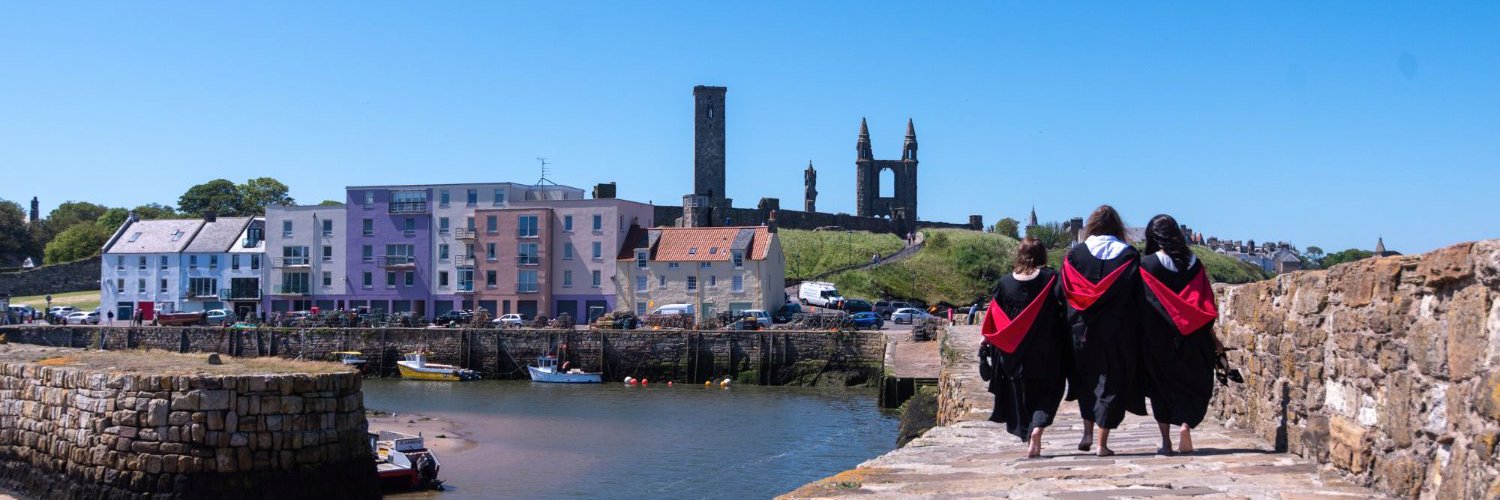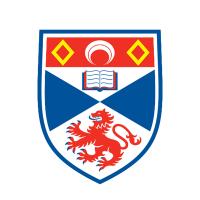Materials Chemistry BSc (Honours)
The BSc (Hons) in Materials Chemistry seeks to develop an understanding of the interrelationships between the composition, structure, microstructure and properties of matter in order to design and develop new materials. Examples may include: semiconductor processing and fabrication, materials for energy and IT, biomaterials, catalyst materials, ‘smart coatings’ and nanotechnology.
During your degree, you will be provided with a broad base of chemical knowledge and understanding reinforced by extensive practical experience and familiarity with modern laboratory, instrumental and computational techniques. You will obtain the necessary skills and experience for a career in industry, education or research.
Students interested in this course may also be interested in the Materials Chemistry Integrated Masters course, which allows you to graduate with a Master of Chemistry.
Campus Information
St Andrews
The University of St Andrews is situated in the small town of St Andrews in rural Fife, Scotland. The university has teaching facilities, libraries, student housing and other buildings spread throughout the town. Generally, university departments and buildings are concentrated on North Street, South Street, The Scores, and the North Haugh.
Intakes
- Sep
Application Processing Time in Days: 14
Minimum English Language Requirements
| English Level Description | IELTS (1.0 -9.0) | TOEFL IBT (0-120) | TOEFL CBT (0-300) | PTE (10-90) | |
|---|---|---|---|---|---|
| Expert | 9 | 120 | 297-300 | 86-90 | |
| Very Good | 8.5 | 115-119 | 280-293 | 83-86 | |
| Very Good | 8 | 110-114 | 270-280 | 79-83 | |
| Good | 7.5 | 102-109 | 253-267 | 73-79 | |
| Good | 7 | 94-101 | 240-253 | 65-73 | |
| Competent | 6.5 | 79-93 | 213-233 | 58-65 | |
| Competent | 6 | 60-78 | 170-210 | 50-58 | |
| Modest | 5.5 | 46-59 | 133-210 | 43-50 | |
| Modest | 5 | 35-45 | 107-133 | 36-43 | |
| Limited | 4 | 32-34 | 97-103 | 30-36 | |
| Extremely Limited | < 4 | < 31 | < 93 | < 30 |
Job Opportunity Potential
With so many options to choose from, planning your career can sometimes be challenging. The advice on this page will help you break down your career planning into four steps, to make starting the process easier.
1. Develop your self-awareness
Knowing yourself is a key part of the career planning process. Understanding your character and personality will help you choose a role that will make you happy and fulfilled. However, these are not fixed – you’ll develop new skills and learn more about yourself during your time at St Andrews, and throughout any future career.
You should consider what is important to you, such as:
the type of work you enjoy, find most rewarding and do best at
work-life balance
the size of organisation you would like to work for
the importance of job security and location
company culture, including its corporate values
the kinds of people you would like to work with.
You should also consider any obstacles, such as disability or health issues, disappointing exam results, mobility, family responsibilities or any other relevant factors.
To help you develop your self-awareness, consider the following resources:
Prospects Career Planner – provides an easy way to analyse your skills, motivations, and desires, then compares them against a database of over 400 graduate job profiles, offering suggestions for further exploration.
16Personalities – offers a description of who you are and why you do things the way you do.
O*NET Interest Profiler – helps you work out what your interests are and how they relate to the world of work.
VIA Strengths Survey - provides a wealth of information to help you understand your character strengths.
You may also find some career planning books helpful. In particular, What Color is Your Parachute? by Richard Nelson Bolles is a useful resource for further developing your self-awareness. It is available from the Main Library.
2. Build your opportunity awareness
This stage involves exploring different occupations and employment sectors to find out which ones might suit you. You can achieve this in three main ways:
research
talking to others already in similar roles
gaining work experience (including unpaid experience and internships) of the occupations that most interest you.
To help you do this, consider the following resources:
A list of career sectors popular with University of St Andrews students.
The jobs and internships pages - information about how to find work experience and internships, including schemes sponsored by the Careers Centre.
Prospects job profiles - profiles to help you understand what's involved in over 400 graduate roles.
Connecting with alumni on LinkedIn and SaintConnect to see what you can learn from reading about other St Andrews graduates’ career paths. See the make a connection pages for further information.
If you want to study your subject at a more advanced level, further study might interest you. Further study could also be necessary or advantageous to pursuing a specific career. For more information, see the further study pages.
3. Prioritise occupations and make decisions
This stage involves more in-depth research. You should consider the benefits and disadvantages of your shortlisted occupations to help you decide which to pursue further.
You should search for vacancies in your shortlisted occupations, and consider things like:
How well do the jobs meet the requirements that you explored in step 1?
How interesting are the job descriptions?
How many vacancies are there in the locations you would like to work in?
How can you address any job requirements you don’t meet?
Is postgraduate study necessary?
As in step 2, you should also consider connecting with alumni and others using LinkedIn and SaintConnect, asking them about their experiences of your shortlisted occupations.
Gaining work experience can also be a useful way of seeing whether a career is worth pursuing at this stage. For help with finding work experience, see the jobs pages.
4. Transition into further study or work
Once you have followed the previous steps, you may be ready to create an action plan to set out in detail how you will move into your preferred career or course of further study. For help with how to do this, see jobs.ac.uk’s 5 Minute Career Action Plan.
You should also give yourself time to develop the skills necessary to perform well in applications and interviews. For advice on interviews, CVs, assessment centres and more, see the applying for a job or internship pages, and develop skills desired by employers through the Professional Skills Curriculum.
PSW Opportunity
2 years PSW
Admission Requirement / Eligibility Criteria
For entry into undergraduate study at St Andrews, you must meet the University's entry requirements as outlined below.
Indian School Certificate, Intermediate Certificate, Higher School Certificate, Higher Secondary Certificate, All India Senior School Certificate and Pre-University course: (awarded on completion of Standard XII) candidates are expected to obtain a minimum average of 90% (with 90% or higher in any prerequisite subjects) in Standard XII examinations, or A1-A2 if you are taking examinations used by Central Boards.
International Baccalaureate (IB): 36 (HL 6,6,5) to 38 (HL 6,6,6 plus SL 6,6,6). From 2021, programmes requiring A-levels Mathematics will accept either Mathematics: Analysis and Approaches or Mathematics: Applications and Interpretation at higher level.
A-levels: AAB to A*A*A
SQA Highers: AAAB to AAAAB
While not required, applicants may also apply with more than one standardised test, with scores as follows:
AP: Minimum score of 4 with 5 in required subjects
SAT Subject Test: Minimum scores of 650 with 700 and above in required subjects
ACT score of 28+ (writing optional). Applicants are welcome to submit all of their ACT test scores. We will consider the highest scores submitted for each section across multiple testing dates.
SAT: We will accept both the SAT Reasoning Test and the Redesigned SAT Test. SAT Reasoning Test: Redesigned SAT Test (essay optional): Score of 1320+
We will assess the SAT total score out of 1600 and will focus on individual sub-scores in a holistic manner and within the context of the overall application.
We will superscore both the current and the Redesigned SAT but will not superscore using results from both versions of the test.
Official scores from all test dates can be sent directly from the ACT or the College Board.
College Board test code number: 7775
ACT test code number: 5316
AP and SAT Subject Test scores will be used for admissions purposes only and no credits for advanced entry or exemptions will be awarded.
Profile 3-D (Direct entry)
Cambridge English Qualifications
176
IELTS (Academic)
6.5
Profile 1-D (Direct entry)
Cambridge English Qualifications
200
IELTS (Academic)
8.0
Profile 2-M (Faculty of Medicine)
IELTS (Academic)
7.0
Profile 7-D (Direct entry)
Cambridge English Qualifications
169
176
IELTS (Academic)
6.5
- Course Code: F201
- Course Type: Full Time
- Course Level: Bachelors/UG Degree
- Duration: 04 Year
-
Total Tuition Fee:
105400 GBP
Annual Cost of Living: 9207 GBP
Application Fee: 75 GBP
Similar Programs
- Psychology MA (Honours) at University of St Andrews
- Psychology BSc (Honours) at University of St Andrews
- Theoretical Physics MPhys (Honours) at University of St Andrews
- Physics MPhys (Honours) at University of St Andrews
- Physics BSc (Honours) at University of St Andrews
- Astrophysics MPhys (Honours) at University of St Andrews

